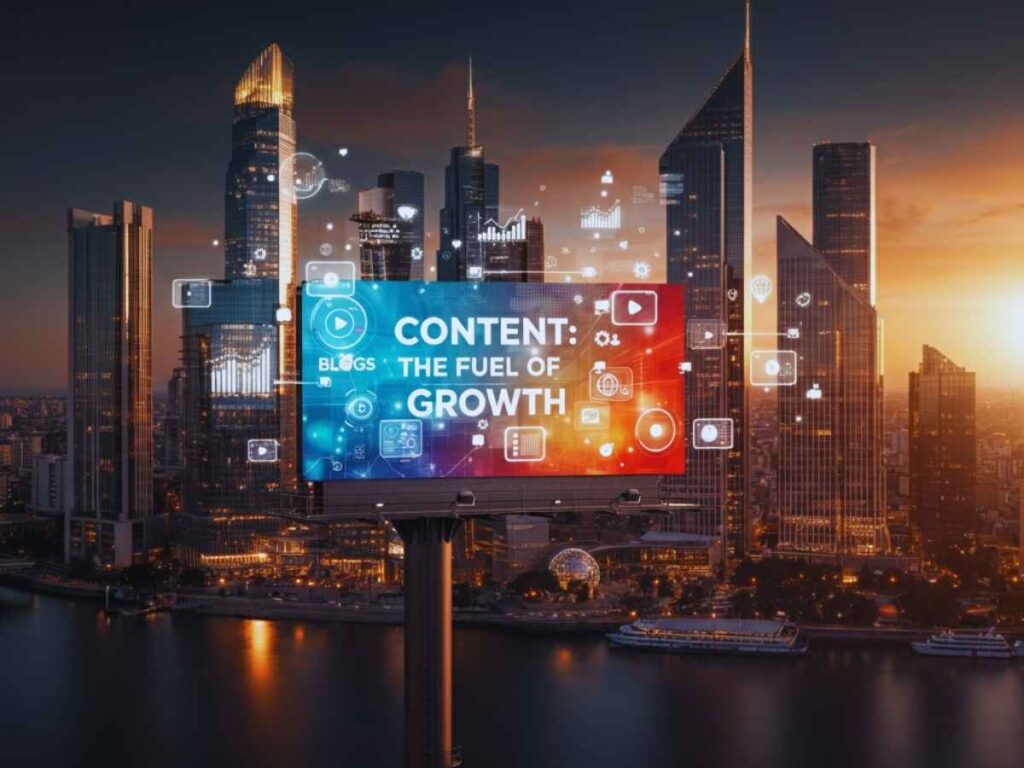Is content marketing really worth the hype? Just ask HubSpot: their blog generates over 13 million views monthly and consistently brings in leads that translate into revenue. That’s the power of content marketing. It’s not just about words on a screen; it’s a strategic approach to business expansion.
For small and medium-sized businesses, startups, and B2B or B2C enterprises, content marketing is a game-changer. If you’re looking to boost visibility, engage your audience, and ultimately drive growth, this guide will show you why and how content marketing works.
From defining what content marketing truly is to actionable strategies for ROI, this blog covers everything you need to know to transform your business through content. Buckle up!
What Is Content Marketing & Why It Works for Expansion
Content marketing is the heartbeat of modern business growth. It’s a strategy focused on creating, publishing, and distributing valuable and relevant content to your audience, with the goal of driving profitable customer actions. But what makes it so revolutionary?
From Ads to Conversations
Traditionally, businesses relied on outbound marketing tactics, such as cold calls or billboards, to capture attention. But consumer behavior has shifted. Today’s audience prefers inbound marketing, which attracts and engages them organically through valuable content. Rather than interrupting someone’s day, you’re adding value to it.
Content marketing builds lasting trust. Over time, quality content nurtures relationships, keeps your brand top-of-mind, and drives long-term loyalty. Compare this to traditional ads that offer momentary bursts of engagement and require constant reinvestment.
Why It Works
- Cost-Effectiveness: Content marketing generates 3x more leads than traditional marketing at a 62% lower cost.
- Long-Term ROI: While ads stop working when the budget runs out, a well-written blog or case study continues to provide value for months or even years.

Core Types of Digital Content That Drive Growth
Creating diverse content types tailored to your audience fuels your growth engine. Here are five core formats to consider:
1. Blog Posts
Blogs are the backbone of many content strategies. They boost SEO by targeting keywords your audience is searching for and provide education on key topics. For example, a marketing agency might write “10 SEO Hacks to Rank on Google.”
2. E-books & Whitepapers
These long-form resources act as lead magnets, providing in-depth knowledge in exchange for a visitor’s contact information. For instance, tech companies often create e-books like “The Complete SaaS Buyer’s Guide.”
3. Case Studies
Case studies showcase real-world success stories, building trust and authority. A SaaS business might highlight how their platform helped an e-commerce client double sales.
4. Video Content
Videos drive engagement like no other medium. Tutorials, product demos, and behind-the-scenes clips create emotional connections. For instance, brands like Canva excel at crafting practical “how-to” videos on YouTube.
5. Infographics
Visually stunning yet informative, infographics help simplify complex data for easy consumption. For example, a fitness app might use infographics to explain “The Science of Fat Burning.”
Each content type aligns with a specific stage of the customer journey:
- Awareness: Blogs and infographics attract new audiences.
- Consideration: E-books and videos educate leads.
- Decision: Case studies and testimonials seal the deal.
Building a High-Impact Content Marketing Strategy
To be effective, content marketing requires more than just creating random blogs or posts. You need a well-thought-out strategy.
1. Set SMART Goals
Define clear goals that are:
- Specific (e.g., grow your email list by 20% in 3 months)
- Measurable
- Achievable
- Relevant
- Time-Specific
2. Know Your Audience
Understanding your audience is critical. Create detailed buyer personas by asking:
- What problems are they trying to solve?
- Where do they consume content (social media, blogs, etc.)?
- What questions are they asking about your niche?
3. Choose the Right Content Formats
Your audience’s preferences should guide your choice of formats. Busy executives may prefer concise whitepapers, while Gen Z loves quick-hit videos.
4. Create a Content Calendar
Map out what you’ll publish and when. This ensures consistency and helps you maintain a steady cadence.
5. Incorporate SEO Research
Use tools like SEMrush or Ahrefs to find high-value keywords, optimize meta descriptions, and structure your content for search engine visibility.
Content Distribution Channels for Maximum Reach
Creating great content is only half the battle. Without distribution, no one will see your work.
Owned Channels
Your website, blog, and email lists are your kingdom. Regularly share new content here to nurture relationships with your core audience.
Earned Media
Earn backlinks to your content through guest posts, PR outreach, or by partnering with industry influencers. These endorsements amplify your reach and boost SEO.
Paid Distribution
Consider running sponsored posts or native ads on platforms like LinkedIn or Facebook to target niche audiences. Paid ads can quickly increase visibility for high-value content.
Repurposing Content
Maximize every piece of content by adapting it for different platforms. Turn a blog into an infographic, a case study into a webinar, or an e-book into social media posts. Repurposing content saves time and extends its lifespan across platforms.
Using Content to Generate Leads and Build Authority
Effective content doesn’t just build engagement; it drives measurable business outcomes.
- Lead Magnets: Offer resources like guides, webinars, or templates in exchange for email addresses.
- Gated Content: For example, releasing a free report behind a sign-up form attracts high-quality leads.
- Thought Leadership: Publish opinion pieces, industry reports, and deep insights to position your business as an expert in its field.
Content that demonstrates authority and provides value builds trust, helping you stand out in a crowded marketplace.

Measuring the ROI of Content Marketing
To ensure your strategy works, consistently measure its success.
Key Metrics:
- Website Traffic: Use Google Analytics to track visitors.
- Engagement: Monitor engagement rates on social media or email campaigns.
- Lead Quality: Evaluate how content-generated leads convert down the funnel.
Long-Term View:
Content marketing is a marathon, not a sprint. Initial results may take time, but ROI compounds over time with effective strategy iteration.
Real Examples of Content-Driven Business Expansion
B2B Example: HubSpot
HubSpot created a treasure trove of blogs and e-books to educate their audience on inbound marketing. These resources drive their pipeline, generating countless leads monthly.
B2C Example: Sephora
Sephora shares beauty tutorials and product guides across its social channels to engage customers. This content strategy turns casual browsers into loyal customers.
You don’t need to be a global giant to see results. These success stories show the tangible benefits of long-term content investment.
Build Your Growth Strategy with Content Marketing
Content marketing isn’t just a buzzword; it’s a proven strategy for sustainable growth. By focusing on delivering value, building trust, and creating content tailored to your audience, your business can stand out, stay competitive, and scale over time.
CTA: “Ready to expand your business with compelling content? Partner with us and transform your content strategy into a growth engine!”





